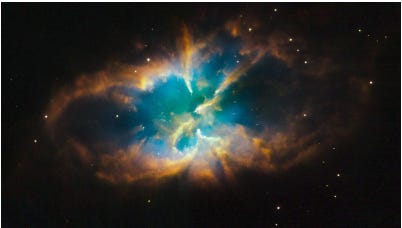Is the Universe Happy?
Hello. I'm going to ask you to take a few leaps here with me today—like in a movie: the suspension of disbelief. Give it a try and let's see where it goes.
Panpsychism is one of the oldest philosophies in the world. Plato ascribed to it (as well as many other thinkers throughout history). Basically, it proposes that (first leap) reality has an awareness that permeates the entire universe. It is alive like you and me.
Back in Plato's time, they didn't really contemplate the universe as we do today, with our large, powerful telescopes like the James Webb Space Telescope. Folks who looked up into the heavens couldn't see that far. The Universe and Reality were basically the same.
Now, we can literally observe at the universe (at least as much as we can actually see, because light can only travel so fast).
When we look up, we see stars, exoplanets, black holes, clumps of gas, and all kinds of weird things. Outer space also includes things we can't visualize, like dark energy and dark matter and tiny particles moving around. Also, our universe includes all the crazy stuff of the quantum world.
In fact, scientists believe there are elementary particles floating around in space. Many suggest, based on experiment and observation, that, like in Plato’s time, reality and the universe are indeed the same—we experience the reality we do because of the universe we live in.
Let's Network
(second leap) When some people look at the structure of the universe, they see a brain (this link has a paywall, sorry about that. It's a brief article and you can get the gist without signing up). These folks who see the universe as resembling a brain aren't talking about the squishy parts that look like corral, but rather the neurons and the brain's organization of its electrical and communication systems.
For me, thinking about the universe as a brain invigorates an interesting question: What do we get from our brain that the universe could possibly get if it was a brain?
Now We're Thinking
The New Scientist article above (third leap) asks if the universe is a brain, could it be conscious? Many cultures empower all sorts of natural elements like mountains, streams, volcanos with acuity and intention. Our civilization is replete with personification: we name cars, pets, body parts, moods, plants.
An inordinate number of spiritual practices, such as the Law of Attraction, Reiki, Chakra work, for example, regard the universe as having an intention or an inherent energy that can be evoked, used, or manipulated. Practitioners of these disciplines often call on the intelligence or spiritual essence of the universe to guide and assist them.
In this way, the universe is not a cluttered, passive blob of incoherent dust, but rather an active, (willing?), intelligent participant in their work.
On a Scale of 1 to 10
My question in all of this is: If the universe is conscious, does it feel (fourth leap)? Does it have desires and emotions? Does it experience joy and pain? If so, could it be pissed or disappointed?
What does an angry universe act like?
Or perhaps, because everything is relative (thanks Einstein!), my universe, my reality is different than yours? Does our own personal universes follow us around like a cartoon rain cloud?
So, possibly, the universe is made up of a lot of little brains (including yours and mine and squirrels).
Happy reading, writing, and thinking.







